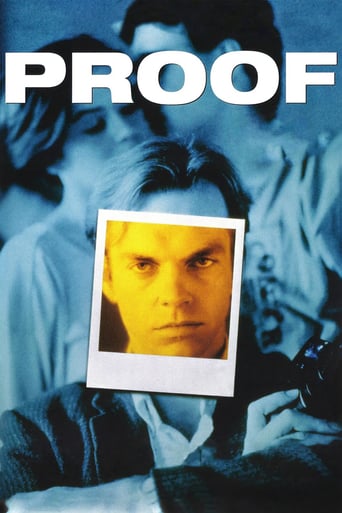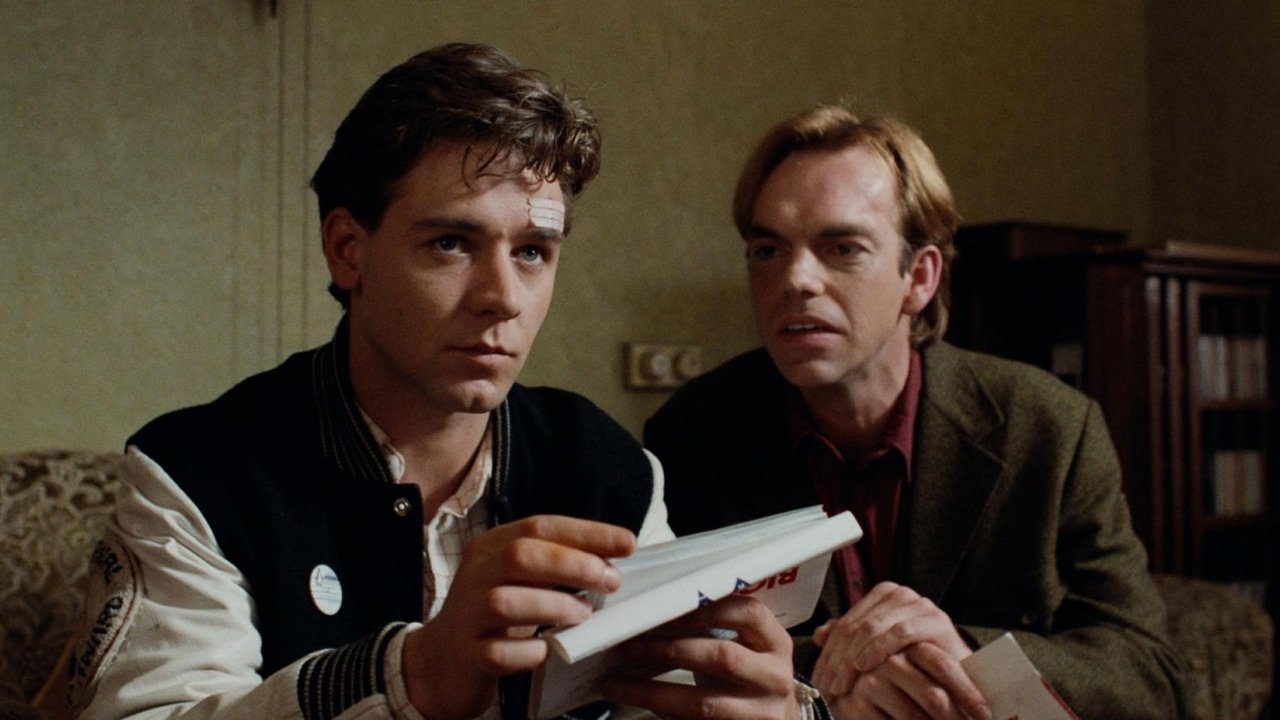bandw
When I heard that this story involved a blind photographer my first reaction was, "I don't get it." So, one reason I watched this was to see how that premise could play out in any realistic way. And it does. Martin (Hugo Weaving) is the photographer; he takes photos and has people describe them to him. Dating to the relationship with his mother in childhood Martin has an industrial strength case of distrust.Celia (Geneviève Picot) is Martin's housekeeper and the relationship between Martin and Celia is the central focus of the movie. We don't get too far into it before we realize that Celia is deeply in love with Martin, a love that he does not reciprocate. This situation seems to be agreeable to both parties--in fact they appear to get a thrill out of thwarting each other. For example, Celia moves objects around the house just so Martin will crash into them.The game that Martin and Celia are playing is thrown off center when Andy (a young Russell Crowe) befriends Martin, and that is when things get interesting. Andy finds Martin's hobby curious and is happy to describe the photos for him. How Celia uses her sexuality to deal with her jealousy, how Martin uses his photos to deal with his trust problems, and how poor, innocent Andy deals with being sucked into the vortex of this battle of wills is what makes the movie engaging. It reminds me of how the innocent young professor and his wife were pulled into the private war that George and Martha were fighting in "Who's Afraid of Virginia Woolf?"I had a little problem with the casting. It was hard to see what Celia found in Martin that would create an obsessive love, but I suppose in the area of sex and love anything is possible. And it was difficult for me to believe that the eminently handsome and likable Andy could have been alone in the world, so alone as to befriend Martin.
Sindre Kaspersen
Australian writer and director Jocelyn Moorhouse's directorial debut which was honored with six Australian Film Institute Awards in 1991 and the Golden Camera at the 44th Cannes Film Festival in 1991, tells the story about 32-year-old Martin who lives a very quiet life in a suburb with his dog Bill. Martin has been blind since the day he was born, something that has given him severe trust issues and motivated him to take photographs which he uses to reassure himself and to have proof that the things he senses are the same as what other people see. One day he encounters Andy, a young kitchen hand who takes an interest in him. Andy's genuine kindness appeals to Martin and for the first time in his life, Martin asks another person to describe his photos for him. Martin and Andy's friendship is beginning to evolve, but when Martin's long time housekeeper Celia who is in love with him learns that she is no longer Martin's sole confidant, she becomes jealous.This mysteriously atmospheric study of character, an outstanding feature film debut which was compassionately written and directed by Jocelyn Moorhouse and shot in Melbourne, has an efficient score by former Australian band Not Drowning, Waving and is a dialog-driven love triangle with great emotional depth which gives an insightful depiction of blindness. Captivating acting performances by Australian actors Hugo Weaving, Russell Crowe and Australian actress Genevieve Picot and commendable and essential use of visuals by amongst others cinematographer Martin McGrath and Jocelyn Moorhouse underlines this Australian independent film which is an engaging, perceptive and humorous psychological drama about trust, friendship and love.
dougjn
I was interested in seeing this movie when it appeared on cable, and it's principally interesting, as one of the first bits of work of Russell Crowe which are widely available. He does a fine job. Unfortunately I really can't recommend it. Whoever did the casting did a dreadful and fundamentally false job. Yes it's slow paced but it also has low intellectual density. There just isn't enough going on in this narrow little world. Worse a good lot of what is going on rings fundamentally false.There certainly could be a great deal interesting about a blind man, Martin, and his long time faithful housekeeper (played by Picot), who's sexually and emotionally obsessed with him even though or maybe partly because he treats her coldly and even semi cruelly, while never acceding to her desires for intimate relations. Martin too has a twisted attraction to Picot, primarily because he can deny her, and yet she keeps coming back to him. We learn it all goes back to some lies Martin's convinced his mother repeatedly told him as a child, and related things. Into all this twisted pair comes the early twenties Russell Crowe, working for the moment as a restaurant kitchen worker, who surprisingly accedes to the blind man's at first very hesitant efforts to befriend him. Increasingly they do become genuine if strange friends, around the conceit of Martin's use of picture taking as "proof" that he's experiencing the world, and his need for someone to describe the pictures back to him "so he can label them". The housekeeper Picot finds this sunny friendship threatens her psychological pas de deux with Martin, and so a dark psychological triangle ensues.A story like this lives or dies according to it's artistic understanding of human character dynamics and psychological forces. This Martin would simply not attract or hold Picot's interest. I get the mutual masochism/sadism going on, but those things require a sufficiently worthy subject to become darkly obsessed with to begin with. I see why Martin might be to Picot, but not at all why Picot would. That simply doesn't work. Martin doesn't have the female sexual attraction chops sufficient for a Picot. It's false.OK she's a few years (about five) older (though she doesn't look it) though both are in their thirties, but she is good if not spectacular looking, thin and even has a rather naturally elegant and intelligent air about her. He's good enough looking but hardly suffused with charisma or edgie energy. Instead he's at least fairly nerdy looking, with absolutely nothing going on in his life, socially or achievement wise. He does essentially nothing. For her to be obsessively attracted to a blind man is hardly impossible. If he were accomplished in some way, especially artistically, or rich or socially connected, or very intelligent and intellectually interesting, or at least had compelling and believable ambitions, then it could be believable. If he had a truly magnetic personality others, a number of others, would be attracted to him too. They aren't. Here he's not even in any social network. He lives a tiny almost hermit life. Meanwhile, it's unbelievable enough that a woman of Pico's age (mid thirties), looks and intelligence, with no immigrant language challenges, would remain a long term housekeeper, much less one to a blind man in a pokey little flat, for little money. Her obsessive attraction to him just doesn't work for fundamental reasons of female sexual dynamics. The mutual orphans at a young age thing and duet of dependent cruelness could well juice up and twist an initial sexual attraction based on a lot more than we have here, but as it is, it just doesn't compute. And so it tells us false things about people, and women.I could say similar things about Crowe being attracted to Martin as a friend he spends lots of time with. Now if Martin were rich or well connected, or had knowledge of or entre into some other world that Crowe felt shut out of, that would be something else. But the Crowe of this film, though believably enough a "black sheep" who's irresponsible and has gone from job to job, is obviously a high testosterone stud of a guy. Crowe can play the introvert and often has, and does here as well, in addition to the tough "bad boy" side to him. It's not impossible that his character would accept the friend overtures of someone with Martin's personality. But it does seem will nigh impossible to me that he'd spent lots of time with this Martin who has so little to offer i.e. inhabited such a tiny, do nothing and know no one world as Martin does here. If dark psychological dramas aren't based on true character dynamics, then really what are they worth? False insights are worse than useless.
Doug (padawandoug)
This is, simply put, a great movie. I won't go into the plot too much, as many other commenters do a good job of that. But suffice to say, the trio of Russell Crowe, Hugo Weaving and Genevieve Picot do more acting in this movie than is contained in all of the blockbusters the first two have made since. (I haven't seen Picot in anything else, so can't comment on her subsequent choices.)It is definitely a small movie. But that's not a bad thing. Most people's lives are small, and this movie is a good example of how even small events -- especially small events -- can have a huge impact on a person's life.The essential thing about the movie is not that it's about a blind guy. It's about a guy who is incapable (at the beginning, anyway) of trust. Which is why he must have "proof" of everything around him in the form of photographs (which he, paradoxically, cannot see himself, but must have described to him). By the end of the movie, he has grown enough, or become desperate enough, to try to trust Andy, and show him the most "most important photo I've ever taken."Genevieve Picot, as the suffering, love stricken housekeeper of Martin, is great. I wish I could see more of her work.This movie also has some really funny moments, and yes, the funniest line is "I forgot." The second funniest is "Brian." See the movie and you will understand (and laugh your ass off too). One final note: SEE THIS MOVIE!!!!! (Also: make sure to watch on a TV with good sound. It's important for the ending (the last moment before the credits roll).)



 AD
AD




